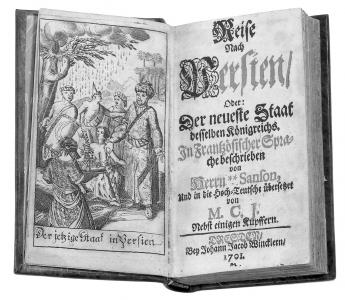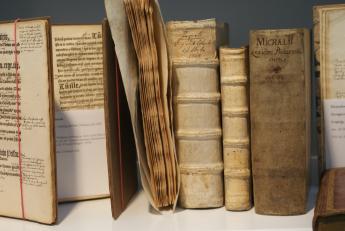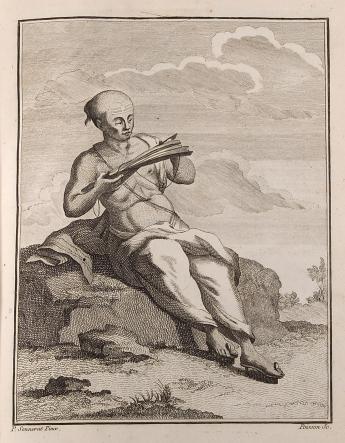Alfredo Breitfeld

Sheila Markham in conversation with Alfredo Breitfeld, Librería de Antaño, Buenos Aires
People who know nothing about this business always ask if we have read all our books. Of course not – but we do have to know certain things about each book that passes through our hands. When I’m researching a book, I try to make it talk to me; I hold it in my hands and this will tell me something about the quality of the binding; I open it and look for ownership marks, and so the process of discovery moves on with every page I turn. I look for any salient points of interest in the text which will help me assess the importance and interest of the book. I also look for historical, literary or scientific material that represents a turning point in its field. As book dealers, we have to be informed about many areas of knowledge in order to evaluate what we have in our hands; we’re not just selling books as inanimate objects.
I began my bookselling career in Uruguay, publishing and selling medical text books. I was a good salesman and enjoyed what I did. After several years, a friend, who had been working for an old established second hand book store in Montevideo, wanted to set up on his own and asked if I would put some money into the business. We opened a book store in the mid-1960s and began trading, mostly in used text books, but also in some antiquarian material. We produced catalogues and gradually began to acquire some quite interesting old books. I can vividly remember the day we received an order from the British Library. It was a fantastic moment for us.
In due course we opened a second book store, and then things started to go wrong and eventually resulted in the end of our business partnership. We had borrowed money to finance our expansion and, when we split, my partner kept the book store and I kept the debt and a huge amount of old books about which I knew very little. I had to educate myself rather quickly, and soon discovered that it was a case of amor a prima vista.
My wife, Susana, is from Argentina and, for various family reasons, a time came when we decided to move to Buenos Aires. We had a very good business in Montevideo, and I can only describe this decision as romantic rather than practical – it was certainly not based on sound economics. My wife had studied psychology and was working as a kindergarten teacher when we met. But she became a partner in my book business and we have worked very happily together for over forty years.
In Buenos Aires, we called our business Librería De Antaño. At first we mainly sold new books and out of print books to institutional libraries that belonged to SALALM (Seminar on the Acquisition of Latin American Library Materials). It was largely a case of filling standing orders, and was quite a profitable business. We were also gradually developing the antiquarian side, and selling complete sets of periodicals. That particular market has completely disappeared, except for the rarest material. It’s an international phenomenon, and I can only guess that it must be linked to the ease of photocopying, the coming of the Internet, or simply shortage of space.
There are several universes in this business, and it is a constant challenge as one discovery leads on to the next. First you encounter the universe of ‘small’ books for general reading purposes, and then you move out into the rarefied world of good, very good and impossibly scarce books until you are thoroughly poisoned by the urge to explore ever further afield. We specialised at that time in rare South American material from the Independence period onwards, and also in first editions and forming collections for institutional libraries.
About twenty years ago, our youngest son, Gustavo, became a partner, and we have been most fortunate in this respect. It’s quite unusual nowadays for children to follow their parents into the family business – I always think of the great American bookseller, Jake Zeitlin and his five sons, none of whom went into the antiquarian business. I remember the exact moment when Gustavo took to the idea of becoming a bookseller. His school teacher had arranged for a group of his class mates to come and visit our book store and learn a little about the strange world of old books. I showed the children various things that might amuse them, and something in my son just clicked.
When Gustavo began working with us, I warned him that you cannot fall in love with the first book that you handle in the morning, and spend all day working on it. If you want to earn a living from books, you have to work efficiently while you’re in the shop, and educate yourself in your own time - otherwise you had better be a millionaire or a collector. In the meantime, Gustavo graduated in psychology, and perhaps this helps him to work with his father! We both share an inquiring mind, and enjoy adding books to our reference library. We have an extensive collection of bibliographies on the Spanish world, and Gustavo is very skilled at describing important material.
When we acquire a rare book, we play a little ‘game’, testing each other about its prospective value, before looking at any online database. Our opinion almost always coincides. We complement each other very well – my experience and knowledge and his intelligence, love for the profession and understanding of modern business methods which have enabled us to bring Librería de Antaño into the twenty-first century. In 1995 we opened The Antique Book Shop, a very ‘gaucho’ name, in a fancy part of town, where we meet a different brand of customer. Gustavo also takes care of this shop.
..........
Argentina is certainly the most bookish country in South America, even though many of the great libraries have now been dispersed. In the past it was home to many extremely important collectors, often very wealthy individuals. Nowadays there is a new generation of book collectors, highly cultured people who are not necessarily wealthy, but simply want to learn more about the history of their country. My son tends to look after this younger generation, as he is more in touch with their tastes and interests.
We began buying more international material and concentrating, within our speciality, on the better and older books in the field of Americana and, to some extent, Hispanica, and publishing nicely produced illustrated catalogues. We increased our presence at international book fairs and, of course, embraced the Internet, and both these moves were fundamental to the development of the business. I confess that my knowledge of the new technology is quite elementary, but I could not work without it. Gustavo looks after that side of the business, and the book store is now run on thoroughly modern lines.
The fashion for nineteenth century colour-plate books of views and costumes of Argentina has almost disappeared here. The finest examples were produced by French artists. They are very beautiful books, but extremely difficult to find, and so expensive that they have priced themselves out of the local market. There are a number of foreign booksellers who visit Buenos Aires, combining pleasure and some business, as it is sometimes still possible to find good books here. But there isn’t a steady flow, and I buy mostly from foreign book dealers.
As you would expect, we specialise in anything at all to do with Jorge Luis Borges, the great poet, essayist and short-story writer who was born in Buenos Aires in 1899. Any event to do with Borges was always a tremendous social occasion here, attracting vast crowds, journalists and photographers. I remember standing in a long queue to have my copy of his last book, La Cifra signed when it came out in 1981. When I finally got to the great man, I told him that I was an antiquarian bookseller, to which he replied, ‘I would love to have embraced that profession when I was young, and my father too’. His father had been, amongst other things, an unsuccessful writer, and the young Borges had grown up in his father’s extensive library, on the understanding that he would fulfil his father’s literary ambitions. I was so nervous when I met Borges that I forgot to ask for his signature in my book. So I got back in the queue and, in due course, was amazed to find that he had remembered my name and occupation. However he wasn’t signing any more copies that day. I treasure it as one of my most famous unsigned books.
There are many collectors and institutions in the Americas who are interested in the publications of the first presses in this region. The history of printing in Spanish America dates from 1539 when the first book was printed in Mexico, a hundred years before the first book was printed in America. In the early 1580s, Antonio Ricardo set up a printing office in Lima and, in 1584, the Doctrina Christiana became the first book printed in Peru, and indeed in South America. It is of the utmost rarity and importance, not only in printing history, but also for the light it throws on the languages of Inca culture in the sixteenth century – the text is printed in Spanish, Quechua and Aymara. I have handled a few copies in my time, but not for over ten years.
José Toribio Medina was the greatest bibliographer of colonial Spanish America. His monumental four-volume work, La imprenta en Lima, was published in Santiago de Chile, 1904-07, and opens with the Doctrina Christiana. A Chilean lawyer and historian, Medina travelled the continent at the turn of the last century, visiting the most remote places, crossing the Mexican countryside on a donkey, discovering unknown imprints in incredible places, consulting libraries and gathering information on the history of printing in all the Spanish-speaking South American countries. If a book is described in a catalogue as ‘not in Medina’, you can be sure that it is a real rarity.
..........
As an occupation, the book trade has thrived largely unchanged since the Middle Ages. Ironically it is also ideally suited to the new technology, and is one of the activities to have benefited most from the coming of the Internet. As a source of information, I admire it more every day. It has certainly enabled buyers to check if a book is rare or not – I believe that many dealers have gone out of business because their definition of rarity depended on customers’ inability to verify it. As a means of selling books, I have found it very useful for disposing of the odds and ends outside my specialist field – the books that we all accumulate over the years, and for which we have no particular customer. I have also benefited enormously from the ability to read auction catalogues online, saving a fortune in subscriptions - not to mention the frustration when the post lets me down.
We continue to produce a printed catalogue of our stock, as there are still plenty of people who don’t have access to the Internet, or choose not to use it for this purpose. Many collectors appreciate the personal touch of receiving a catalogue. Technology plays a very important role in our lives, but I’m not pessimistic about the future of the rare book trade. I can’t imagine a time when people will collect, say, PDFs – rare and beautiful books will disappear only if beauty itself disappears from our existence. While humanity still has a soul, the book will remain in its present physical form. Finally, I like to think that this blessed profession has enabled me to enjoy a decent standard of living surrounded by what I love most – my books and my family.
Librería De Antaño (Buenos Aires), owned by Alfredo Breitfeld, is specialized on early printing, incunabula, travel, rare Latin Americana and Spain, including Mexico and the Caribbean.
Alfredo Breitfeld, interviewed for The Bookdealer in August 2008. The interview is published on www.sheila-markham.com, it is presented here, with our thanks, by permission of Sheila Markham.


